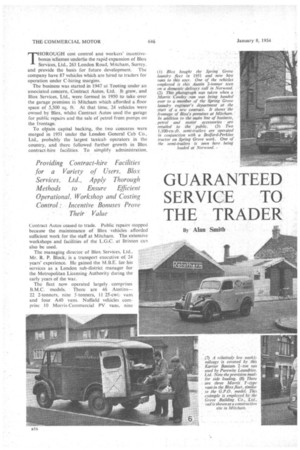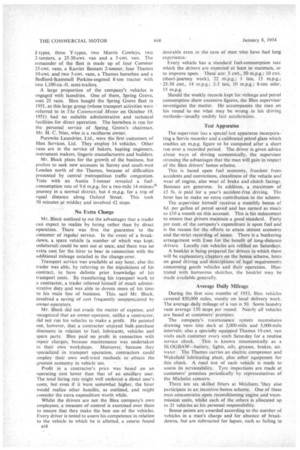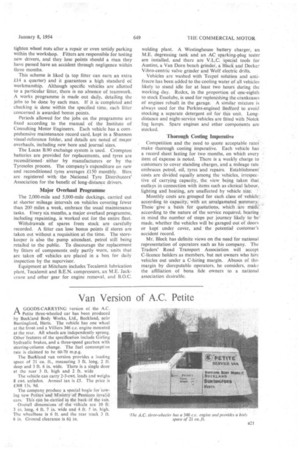GUARANTEED SERVICE TO THE TRADER
Page 50

Page 52

Page 55

If you've noticed an error in this article please click here to report it so we can fix it.
By Alan Smith THOROUGH cost control and workers' incentivebonus schemes underlie the rapid expansion of Blox Services, Ltd., 263 London Road, Mitcham, Surrey, and provide the basis for future development. The company have 87 vehicles which are hired to traders for operation under C-hiring margins.
The business was started in 1947 at Tooting under an associated concern, Contract Autos, Ltd. It grew, and Blox Services, Ltd., were formed in 1950 to take over the garage premises in Mitcham which afforded a floor space of 5,500 sq. ft. At that time, 24 vehicles were owned by Blox, whilst Contract Autos used the garage for public repairs and the sale of petrol from pumps on the frontage. .
To olztain capital backing, the two concerns were merged in 1951 under the London General Cab Co., Ltd., probably the largest taxicab operators in the country, and there followed -further growth in Blox contract-hire facilities. • To simplify administration, Contract Autos ceased to trade. Public repairs stopped because the maintenance of Blox vehicles afforded sufficient work for the staff at Mitcham. The extensive workshops and facilities of the L.G.C. at Brixton can also be used.
The managing director of Blox. Services, Ltd., Mr. R. P. Block, is a transport executive of 24 years' experience. He gained the M.B.E. for his services as a London sub-district manager for the Metropolitan Licensing Authority during the early years of the war.
The fleet now operated largely comprises B.M.C. models. • There 'are 46 Austins22 2-tonners, nine 5-tonners, 11 25-cwt: vans and four A40 vans. Nuffield vehicles comprise 10 Morris-Commercial PV vans, nine I-types, three Y-types, two Morris Cowleys, two 2-tonners, a 25-30-cwt. van and a 5-cwt. van. The remainder of the fleet is made up of four Commer 25-cwt. vans, a Karrier Bantam 2-tonner, four Thames 10-cwt. and two 5-cwt. vans, a Thames horsebox and a Bedford-Scammell Perkins-engined 8-ton tractor with two 1,100-eu.-ft. semi-trailers.
A large proportion of the company's vehicles is engaged with laundries. One of them, Spring Grove, uses 25 vans. Blox bought the Spring Grove fleet in 1951, as this large group (whose transport activities were referred to in The Commercial Motor on October 19, 1951) had no suitable administrative and technical facilities for direct operation. The horsebox is run for the personal service of Spring Grove's chairman, Mr. H. C. Nias, who is a racehorse owner.
Purewite Laundries, Ltd., were the first customers of 13Iox Services, Ltd. They employ 14 vehicles.. Other vans are in the service of bakers, heating engineers, instrument makers, lingerie manufacturers and builders.
Mr. Block plans for the growth of the business, but prefers to seek new accounts in Surrey and south-west London north of the Thames, because of difficulties presented by central metropolitan traffic congestion. Tests with an Austin 5-tonner revealed a fuelconsumption rate of 9.6 m.p.g. for a two-mile 14-minute* journey in a normal district, but 4 m.p.g. for a trip Of equal distance along Oxford Street. This took 50 minutes at rnidday and involved 42 stops.
No Extra Charge Mr. Block outlined to me the advantages that a trader can expect to realize by hiring rather than by direct operation. There was first the guarantee to the customer of regular service. In the event of a breakdown, a spare vehicle (a number of which was kept, unlettered) could be sent out at once, and there was no extra cost for the hirer to bear in connection with the additional mileage entailed in the change-over.
Transport service was available at any hour, also the trader was able, by referring to the stipulations of his contract, to have definite prior knowledge of his transport costs. By transferring his transport work to a contractor, a trader relieved himself of much administrative duty and was able to devote more of his time to his main line of business. This, said Mr. Block, involved a saving of cost frequently unappreciated by owner-operators.
Mr. Block did not evade the matter of expense, and recognized that an owner-operator, unlike a contractor. did not run his vehicles to make a profit. He pointed out, however, that a contractor enjoyed bulk-purchase discounts in relation to fuel, lubricants, vehicles and spare parts. Blox paid no profit in connection with repair charges, because maintenance was undertaken in their own workshops. Moreover, because they specialized in transport operation, contractors could employ their own well-tried methods to obtain the greatest economy in vehicle use.
Profit in a contractor's price was based on an operating cost lower than that of an ancillary user. The total hiring rate might well undercut a direct user's costs, but even if it Were somewhat higher, the hirer would realize other benefits, as outlined, and might consider the extra expenditure worth while.
Whilst the drivers are not the Blox company's own employees, a measure of control is exercised over them to ensure that they make the best use of the vehicles_ Every driver is tested to assess his competence in relation to the vehicle to which he is allotted, a course found si8 desirable even in the case of men who have had long experience: Every vehicle has a standard fuel-consumption rate which the drivers are expected at least to maintain, or to improve upon. These are: 5 cwt., 30 m.p.g.; 10 cv,tt. (short-journey work), 22 m.p.g.; 1 ton, 15 m.p.g.; 25-30 cwt., 14 m.p.g.; 2-5 ton, 10 m.p.g.; 8-ton oiler, 15 m.p.g.
Should the weekly records kept for mileage and petrol consumption show excessive figures, the Blox supervisor investigates the matter. He accompanies the man on his round to see what may be wrong in his driving methods—usually unduly fast acceleration.
Test Apparatus The supervisor has a special test apparatus incorporating a Servis recorder and a calibrated petrol glass which enables an m.p.g. figure to be computed after a short run over a recorded period. The driver is given advice about ways of driving economically, the supervisor stressing the advantages that the man will gain in respect of the Blox drivers' bonus scheme.
This is based upon. fuel economy, freedom from accidents and convictions, cleanliness of the vehicle and wear of engine, also wear of brake and .clutch facings. Bonuses are generous. In addition, a maximum of £5 5s. is paid for a year's accident-free driving. The hirer has to make no extra contribution to the scheme.
The supervisor himself receives a monthly bonus of 6d. per gallon of petrol saved and has earned as much as ,E10 a month on this account. This.is his inducement to ensure that drivers maintain a good standard. Forty per cent, of the company's expenditure is upon fuel and is the reason for the efforts to attain utmost economy and the strict recording of issues. There is a bunkering arrangement with Esso for the benefit of long-distance drivers. Locally run vehicles are refilled on Saturdays.
A booklet is being prepared for drivers in which there will be explanatory chapters on the bonus scheme, hints on good driving and descriptions of legal requirements concerning goods vehicles and their operation. Illustrated with humorous sketches, the booklet may be made available generally.
Average Daily Mileage During the first nine months of 1953, Blox vehicles covered 850,000 mites, mostly on local delivery work. The average daily mileage of a van is 50. Some laundry vans average 150 stops per round. Nearly all vehicles are based at customers' premises.
The company's maintenance system necessitates drawing vans into dock at 2,000-mile and 5,000-mile intervals; also a specially equipped Thames 10-cwt. van visits each customer every sixth Saturday for a routine service cheek. This is known mnemonically as a BLOC BAW—battery, lights, oils, greases, brakes, air, water. The Thames carries an electric compressor and NMakefield lubricating plant, plus other equipment for this check. A road test of each vehicle is made to assess its serviceability. Tyre inspections are made at customers' premises periodically by representatives of the Michelin concern.
There are six skilled fitters at Mitcham; they also participate in an incentive-bonus scheme, One of these men concentrates upon reconditioning engine and transmission units, whilst each of the others is allocated up to 21 vehicles as his personal responsibility.
Bonus points are awarded according to the number of vehicles in a man's charge and for absence of breakdowns, but are subtracted for lapses, such as failing to tighten wheel nuts after a repair or even untidy parking within the workshop.. Fitters are responsible for testing new drivers, and they lose points should a man they have passed have an accident through negligence within three months.
This scheme is liked (a top fitter can earn an extra L14 a quarter) and it guarantees a high standard of workmanship. Although specific vehicles are allotted to a particular fitter, there is no absence of teamwork. A works programme is made out daily, detailing the jobs to be done by each man. If it is completed and checking is done within the specified time, each fitter concerned is awarded bonus points.
Periods allowed for the jobs on the programme are fixed according to the manual of the Institute of Consulting Motor Engineers. Each vehicle has a comprehensive maintenance record card, kept in a Shannon visual-reference folder, and details are noted of major overhauls, including new bore and journal sizes.
The Lucas B.90 exchange system is used. Crompton. batteries are provided for replacements, and tyres are reconditioned, either by manufacturers or by the Tyresoles process. The company's expenditure on new and reconditioned tyres averages £150 monthly. Blox are registered with • the National Tyre Distributors' Association for the benefit of long-distance drivers.
Major Overhaul Programme
The 2,000-mile and 5,000-mile dockings, carried out at shorter mileage intervals on vehicles covering fewer than 200 miles a week, embrace the usual maintenance tasks. Every six months, a major, overhaul programme, including repainting, is worked out for the entire fleet.
Withdrawals of spares from stock are carefully recorded. A fitter can lose bonus points if stores are taken out without a requisition at the time. The storekeeper is also the pump attendant, petrol still being retailed to the public. To discourage the replacement by fitters of components,. only partly worn, units that are taken off vehicles are placed in a box for daily inspection by the supervisor.
Equipment at Mitcham includes Tecalemit lubrication plant, Tecalemit and B.E.N. compressors, an M.E. Jackcrane and other gear for engine removal, and B.O.C. welding plant. A Westinghouse battery charger, an M.E. degreasing tank and an AC sparking-plug tester are installed, and there are V.L.C. Special tools for Austins, a Van Dorn bench grinder, a Black and Decker Vibro-centric valve grinder and Wolf electric drills.
Vehicles are washed with Teepol solution and antifreeze has been added to the cooling water of all vehicles likely to stand idle for at least two haurs during the working day. Redex, in the proportion of one-eighth to stock Essolube, is used for replenishing the cranIceases of engines rebuilt in the garage. A similar mixture is always used for the Perkins-engined Bedford to avoid stocking a separate detergent oil for this unit. Longdistance and night-service vehicles are fitted with Notek fog lamps. Spare engines and other components are stocked.
Thorough Costing Imperative
Competition and the need to quote acceptable rates' make thorough costing imperative. Each vehicle has a record sheet lasting for two months, on which every item of expense is noted. There is a weekly charge to customers to cover standing charges, and a mileage rate embraces petrol, oil, tyres and repairs. Establishment" costs are divided equally among the vehicles, irrespective of carrying capacity, the view being taken that. outlays in connection with items such as clerical labour, lighting and heating, are unaffected by vehicle size;
Monthly costs are grouped for each class of 'vehicle according to capacity, -with an arnalgarnated summary. Thee give a basis fdi quotations, which are according to to the nature of the service required, bearing in mind the number of stops per journey likely to made, whether the vehicles will be garaged out of doors or kept under cover, and the potential customer's accident record.
Mr. Block has definite views on the need for national representation of operators such as his company. The Traders' Road Transport Association will accept C-licence holders as members, but not owners who hire vehicles out under a C-hiring margin. Abuses of this margin by disreputable operators, he considers, make the affiliation of bona fide owners to a national association desirable.




































































































